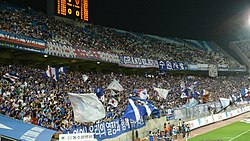Teams
General information
Stadiums
| Daegu FC | Gangwon FC | Gyeongnam FC | Incheon United | Jeju United | Jeonbuk Hyundai Motors |
|---|---|---|---|---|---|
| Daegu Stadium | Chuncheon Songam Leports Town | Changwon Football Center | Incheon Football Stadium | Jeju World Cup Stadium | Jeonju World Cup Stadium |
| Capacity: 66,422 | Capacity: 20,000 | Capacity: 20,245 | Capacity: 20,891 | Capacity: 35,657 | Capacity: 42,477 |
 |  |  |  |  | |
| Jeonnam Dragons | Pohang Steelers | Sangju Sangmu | FC Seoul | Suwon Samsung Bluewings | Ulsan Hyundai |
| Gwangyang Football Stadium | Pohang Steel Yard | Sangju Civic Stadium | Seoul World Cup Stadium | Suwon World Cup Stadium | Ulsan Munsu Football Stadium |
| Capacity: 13,496 | Capacity: 17,443 | Capacity: 15,042 | Capacity: 66,704 | Capacity: 44,031 | Capacity: 44,102 |
 |  |  |  |  |
Foreign players
Restricting the number of foreign players strictly to four per team, including a slot for a player from AFC countries. A team could use four foreign players on the field each game including a least one player from the AFC confederation. Players name in bold are registered during the mid-season transfer window.
- As of 26 May 2018
